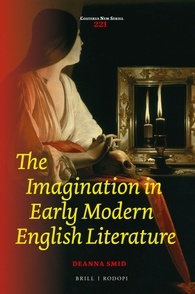The Imagination in Early Modern English Literature

Abstract
In The Imagination in Early Modern English Literature, Deanna Smid presents a literary, historical account of imagination in early modern English literature, paying special attention to its effects on the body, to its influence on women, to its restraint by reason, and to its ability to create novelty. An early modern definition of imagination emerges in the work of Robert Burton, Francis Bacon, Edward Reynolds, and Margaret Cavendish. Smid explores a variety of literary texts, from Thomas Nashe’s The Unfortunate Traveler to Francis Quarles’s Emblems, to demonstrate the literary consequences of the early modern imagination. The Imagination in Early Modern English Literature insists that, if we are to call an early modern text “imaginative,” we must recognize the unique characteristics of early modern English imagination, in all its complexity.
